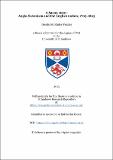Files in this item
A Saxon state : Anglo-Saxonism and the English nation, 1703-1805
Item metadata
| dc.contributor.advisor | Jones, Chris | |
| dc.contributor.advisor | Luxford, Julian | |
| dc.contributor.author | Frazier, Dustin M. | |
| dc.coverage.spatial | xii, 244, [15] p. | en_US |
| dc.date.accessioned | 2013-11-04T12:08:06Z | |
| dc.date.available | 2013-11-04T12:08:06Z | |
| dc.date.issued | 2013-11-30 | |
| dc.identifier.uri | https://hdl.handle.net/10023/4146 | |
| dc.description.abstract | For the past century, medievalism studies generally and Anglo-Saxonism studies in particular have largely dismissed the eighteenth century as a dark period in English interest in the Anglo-Saxons. Recent scholarship has tended to elide Anglo-Saxon studies with Old English studies and consequently has overlooked contributions from fields such as archaeology, art history and political philosophy. This thesis provides the first re-examination of scholarly, antiquarian and popular Anglo-Saxonism in eighteenth-century England and argues that, far from disappearing, interest in Anglo-Saxon culture and history permeated British culture and made significant contributions to contemporary formulations and expressions of Englishness and English national, legal and cultural identities. Each chapter examines a different category of Anglo-Saxonist production or activity, as those categories would be distributed across current scholarship, in order to explore the ways in which the Anglo-Saxons were understood and deployed in the construction of contemporary cultural- historiographical narratives. The first three chapters contain, respectively, a review of the achievements of the ‘Oxford school’ of Saxonists of the late seventeenth and early eighteenth centuries; antiquarian Anglo-Saxon studies by members of the Society of Antiquaries of London and their correspondents; and historiographical presentations of the Anglo-Saxons in local, county and national histories. Chapters four and five examine the appearance of the Anglo-Saxons in visual and dramatic art, and the role of Anglo-Saxonist legal and juridical language in eighteenth-century politics, with reference to discoveries resulting from the academic and antiquarian research outlined in chapters one to three. It is my contention that Anglo-Saxonism came to serve as a unifying ideology of origins for English citizens concerned with national history, and political and social institutions. As a popular as well as scholarly ideology, Anglo-Saxonism also came to define English national character and values, an English identity recognised and celebrated as such both at home and abroad. | en_US |
| dc.language.iso | en | en_US |
| dc.publisher | University of St Andrews | |
| dc.subject | Anglo-Saxonism | en_US |
| dc.subject | Cultural history | en_US |
| dc.subject | Medievalism | en_US |
| dc.subject | Antiquarianism | en_US |
| dc.subject | 18th century | en_US |
| dc.subject | Old English | en_US |
| dc.subject | History painting | en_US |
| dc.subject | Local history | en_US |
| dc.subject | Political theory | en_US |
| dc.subject | Liberalism | en_US |
| dc.subject | English common law | en_US |
| dc.subject | Anglo-Saxon | en_US |
| dc.subject | Alfred the Great | en_US |
| dc.subject | Nationalism | en_US |
| dc.subject.lcc | DA485.F8 | |
| dc.subject.lcsh | England--Civilization--18th century | en_US |
| dc.subject.lcsh | Civilization, Anglo-Saxon--Influence | en_US |
| dc.subject.lcsh | English literature--Old English, ca. 450-1100--History and criticism | en_US |
| dc.subject.lcsh | National characteristics, English | en_US |
| dc.title | A Saxon state : Anglo-Saxonism and the English nation, 1703-1805 | en_US |
| dc.type | Thesis | en_US |
| dc.type.qualificationlevel | Doctoral | en_US |
| dc.type.qualificationname | PhD Doctor of Philosophy | en_US |
| dc.publisher.institution | The University of St Andrews | en_US |
| dc.rights.embargoreason | Embargo period has ended, thesis made available in accordance with University regulations | en_US |
| dc.identifier.doi | https://doi.org/10.17630/10023-4146 |
This item appears in the following Collection(s)
Items in the St Andrews Research Repository are protected by copyright, with all rights reserved, unless otherwise indicated.

